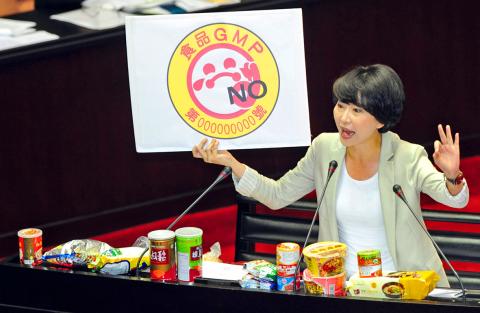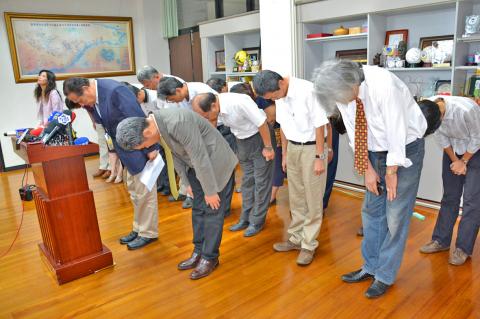The current administration should be pulled off the shelves along with other tainted products, Democratic Progressive Party (DPP) Legislator Chen Ting-fei (陳亭妃) said as Cabinet members came under a bipartisan barrage of questions and criticisms on the legislative floor yesterday.
The Cabinet is led by the same premier and has the same minister of health and welfare who called for the public to have faith in the Good Manufacturing Practices (GMP) certification process after the previous tainted food oil scare, but the system has failed once again despite the public’s expectations, Chen said.
“The government is the product that needs to be taken off shelves,” the DPP lawmaker said.

Photo: Lo Pei-der, Taipei Times
Chinese Nationalist Party (KMT) Legislator Hsu Hsin-ying (徐欣瑩) said the GMP label has come to stand for “Give Me Poison.”
She said the latest scandal shows that frequent inspections of manufacturers’ production facilities and tougher penalties are needed, and proposed dropping the prohibitions against double jeopardy and raising the maximum fine for violators of food safety laws to NT$100 million (US$3.31 million).
KMT Legislator Sun Ta-chien (孫大千) said the Financial Supervisory Commission should require each listed food company to set up its own food inspection department and make such departments a perquisite for a manufacturer wanting to go public. Major food corporations cannot claim to be innocent victims every time a food scare breaks out, Sun added.

Photo: Hou Cheng-hsu, Taipei Times
There are more than 3 million food categories — including finished products, semi-finished products, raw materials and food additives — that require inspections by health departments, but there are fewer than 1,000 food safety inspectors, Sun said, adding: “This is a structural problem.”
DPP Legislator Pasuya Yao (姚文智) also criticized the shortage of qualified inspectors.
After the last tainted food oil scandal, the health ministry in October last year promised to establish a “food safety safeguarding alliance” and recruit students majoring in food and nutrition subjects to conduct inspections, but Minister of Health and Welfare Chiu Wen-ta (邱文達) said the alliance was just established on Monday, which showed the ministry had been procrastinating, Yao said.

Photo: Hou Cheng-hsu, Taipei Times
KMT Legislator Wu Yu-sheng (吳育昇) suggested banning the import of waste oil to prevent more tainted food scandals.
Premier Jiang Yi-huah (江宜樺) told lawmakers that edible, industrial and fodder oil have always been separately administered and tested, but Chang Guann Co (強冠企業), whose edible lard oil has been found to be mixed with recycled cooking oil, was both an edible oil manufacturer and a trading company.
Jiang said the government would step up the inspections of importers to avoid such misuse.
Meanwhile, Pingtung County Commissioner Tsao Chi-hung (曹啟鴻), a DPP member, bowed deeply as he apologized for the tainted oil scandal, which is linked to an illegal factory in the county.
Tsao said he had accepted the resignations of five of his top officials, including the heads of the environmental protection and public health bureaus. The resignations are to take effect on Nov. 1.
The latest food scandal erupted on Sept. 4 after it was found that Greater Kaohsiung-based Chang Guann Co used recycled oil made from kitchen waste and grease from leather processing plants in its fragrant lard oil products. That waste was collected and processed by an unlicensed factory in Pingtung County that had been the subject of several complaints by area residents in recent years.
Additional reporting by CNA

INVESTIGATION: The case is the latest instance of a DPP figure being implicated in an espionage network accused of allegedly leaking information to Chinese intelligence Democratic Progressive Party (DPP) member Ho Jen-chieh (何仁傑) was detained and held incommunicado yesterday on suspicion of spying for China during his tenure as assistant to then-minister of foreign affairs Joseph Wu (吳釗燮). The Taipei District Prosecutors’ Office said Ho was implicated during its investigation into alleged spying activities by former Presidential Office consultant Wu Shang-yu (吳尚雨). Prosecutors said there is reason to believe Ho breached the National Security Act (國家安全法) by leaking classified Ministry of Foreign Affairs information to Chinese intelligence. Following interrogation, prosecutors petitioned the Taipei District Court to detain Ho, citing concerns over potential collusion or tampering of evidence. The

‘FORM OF PROTEST’: The German Institute Taipei said it was ‘shocked’ to see Nazi symbolism used in connection with political aims as it condemned the incident Sung Chien-liang (宋建樑), who led efforts to recall Democratic Progressive Party (DPP) Legislator Lee Kun-cheng (李坤城), was released on bail of NT$80,000 yesterday amid an outcry over a Nazi armband he wore to questioning the night before. Sung arrived at the New Taipei City District Prosecutors’ Office for questioning in a recall petition forgery case on Tuesday night wearing a red armband bearing a swastika, carrying a copy of Adolf Hitler’s Mein Kampf and giving a Nazi salute. Sung left the building at 1:15am without the armband and apparently covering the book with a coat. This is a serious international scandal and Chinese

Seventy percent of middle and elementary schools now conduct English classes entirely in English, the Ministry of Education said, as it encourages schools nationwide to adopt this practice Minister of Education (MOE) Cheng Ying-yao (鄭英耀) is scheduled to present a report on the government’s bilingual education policy to the Legislative Yuan’s Education and Culture Committee today. The report would outline strategies aimed at expanding access to education, reducing regional disparities and improving talent cultivation. Implementation of bilingual education policies has varied across local governments, occasionally drawing public criticism. For example, some schools have required teachers of non-English subjects to pass English proficiency

TRADE: The premier pledged safeguards on ‘Made in Taiwan’ labeling, anti-dumping measures and stricter export controls to strengthen its position in trade talks Products labeled “made in Taiwan” must be genuinely made in Taiwan, Premier Cho Jung-tai (卓榮泰) said yesterday, vowing to enforce strict safeguards against “origin laundering” and initiate anti-dumping investigations to prevent China dumping its products in Taiwan. Cho made the remarks in a discussion session with representatives from industries in Kaohsiung. In response to the US government’s recent announcement of “reciprocal” tariffs on its trading partners, President William Lai (賴清德) and Cho last week began a series of consultations with industry leaders nationwide to gather feedback and address concerns. Taiwanese and US officials held a videoconference on Friday evening to discuss the